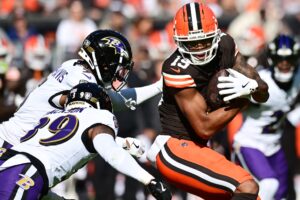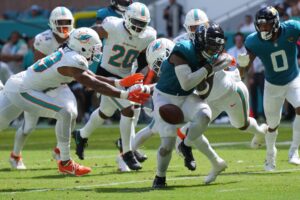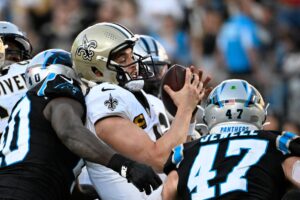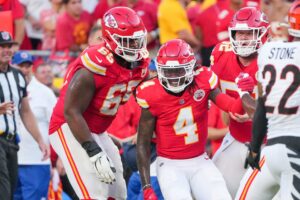It’s probably the oldest adage in pro football lore.
“Defense wins championships.”
It’s a simple phrase consisting of three words. But the meaning carries a great deal of importance in the grand narrative of NFL history. For decades, teams have tried to implement strategies in order to successfully capture a Super Bowl championship. With so much parity in the NFL, it appears the model for building a winning franchise isn’t so simple.
Over the years, there has been a common theory that a stout, physical defense can neutralize a high scoring offense. We’ve seen the adage of “Defense wins championships” become a reality; just ask the 1985 Chicago Bears, the 2000 Baltimore Ravens or the 2013 Seattle Seahawks how they won their respective Super Bowls.
The 2018 NFL season, however, was the most prolific offensive year in recent history. Teams like the New Orleans Saints and Kansas City Chiefs were putting up record numbers. Games would feature a plethora of points being scored. The defense for many teams seemed non-existent.
As the weather turns to cold in January, it means the NFL Playoffs are here. In a year where offense dominated conversation around the NFL, it begs the question of whether a team with a physical defense could be the one to hoist the Lombardi Trophy this February.
Correlation Between Top Defense and Chances to Win Super Bowl
It was famous Alabama Head Coach Paul “Bear” Bryant who coined the phrase “defense wins championships.” I don’t think Coach Bryant would ever imagine that the adage would be entrenched into football conversation and lore.
The defense may not have the same panache as the offense. Let’s face it; players like Tom Brady and Drew Brees carry a great deal of zest compared to top defensive players like Aaron Donald or J.J. Watt. But when building a winning franchise, developing a dominant defense is the course of action management should take if they want to have success in the postseason.
Looking at the sample size of NFL teams to make the playoffs in the modern Super Bowl era (527), the correlation could not be more apparent. The teams who gave up the fewest yards of offense during the regular season won the most playoff games. New England Patriots coach Bill Belichick knows this reality far too well. In all three of his Super Bowl losses, the New York Giants (2007, 2011) and Philadelphia Eagles (2017) neutralized Brady’s offense.
There are Super Bowl winning teams in NFL history that proved that not having a dominant pass offense could be trumped by a historic defense. The 1985 Bears, led by quarterback Jim McMahon, had the 21st ranked pass offense. Defensively, they were ranked first in total defense (3rd pass, 1st rush), averaging 12.4 points per game en route to their Super Bowl win.
The 2000 Ravens, with Trent Dilfer at quarterback, were 22nd in pass offense. But with Ray Lewis and company on defense, they were ranked first overall (1st rush, 8th pass), averaging only 10.4 points per game. They steamrolled through the postseason, capping it off with a 34-7 victory over the Giants in the Super Bowl.
When Russell Wilson won his first Super Bowl with the Seahawks, his passing offense was ranked 26th in the 2013 NFL season. The Seattle defense, known as the Legion of Boom, was ranked first in team defense (8th rush, 1st pass), averaging only 14.4 points per game. The defense flexed its muscles on Peyton Manning and the number one rated Denver Broncos offense in Super Bowl XLVIII, winning 43-8.
2018: The Year of the Offense
Sure the ’85 Bears, ’00 Ravens, and ’13 Seahawks defenses were historic. But it proves the narrative that a team does not necessarily need an overpowering offense to win a Super Bowl if they have a physical defense.
The 2018 NFL season will be remembered for the revolutionary increase in offensive production. Through the first four games of the regular season, there were historical records achieved for offensive numbers, including completions (2,999), completion percentage (65.4), passing yards (32,215), passing touchdowns (228), points scored (3,030) and touchdowns (344). 25 of the 32 teams (78.1%) averaged at least 20 points per game. 19 of the 32 teams (59.3%) have generated over 40 total touchdowns on offense. Super Bowl LII that occurred last February acted as a precursor to the 2018 season, which saw the Eagles and Patriots combine for 74 points. The Los Angeles Rams and Kansas City Chiefs put up 105 points in the 54-51 Monday Night Football classic during the regular season.
“Football, by nature, is dictated by the offense,” Steve Palazzolo, the director of video content at PFF said. “The offense has to innovate and the defense has to react. Any time the offense can get a leg up … I do think we’re at this point where a lot of teams are trying to duplicate what Seattle is doing with Cover 1/Cover 3, and now it’s easier for teams to say, ‘OK, let me see every explosive play the Seattle Seahawks gave up from 2012-2015.’”
Chicago Bears Trying to Skew Offense Narrative
If there is a playoff team in the NFL that is trying to rewrite the offense narrative, it’s the 2018 Bears. Head coach Matt Nagy has orchestrated a team with similarities to the historic ’85 Chicago defense: a solid running game and dominant defense. The Bears have the number one total defense in the NFL (7th pass, 1st rush), averaging 17.4 points per game. The change in the identity of this defense was a result of the trade that sent Khalil Mack to the Bears. He finished the season with 12.5 sacks and one interception, ready to embrace his upcoming challenge of facing the Philadelphia Eagles on Sunday in the playoffs.
“Can’t ever get too high,” Mack says. “Don’t ever get too low. I’ve always thought of myself as the best defensive player in the league and I want to play like the best defensive player in the league, I want to be the best at what I do. That’s just me.”
So I go back to my original question; in a year where offense has dominated, is there a chance that defense can win the Super Bowl? Absolutely there is. Obviously, teams that have high octane offenses are bound to put points on the board. Patrick Mahomes and Drew Brees can only be contained for so long.
But if a dominant defense comes along with a game plan to put pressure on the quarterbacks and stop the run, then it’s anyone’s game. The Chicago Bears, with the league’s number one defense, are trying to spoil the party for the overpowering offenses. They are trying to make the “defense win championships” phrase back into NFL vocabulary once again.
I wouldn’t pass them.






